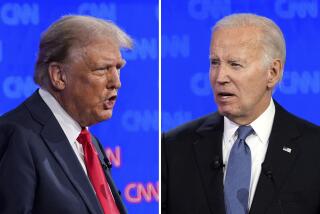It Turns Out Sighs Matter
- Share via
Breathe in. Breathe out. It seems so simple. And yet, when the intake is particularly deep and the outgo unusually sharp, the resulting sigh can reveal far more than words convey.
During last week’s televised presidential debate, candidate Al Gore’s sighs, loud and noticeably theatrical, set off a round of speculation.
Vicki Marsh Kabat, a mother of three from Waco, Texas, thinks Gore was just frustrated and letting off steam the way she and her family often do. “I think a sigh is better than a scream,” says Kabat, who once described her family’s sighing in a column for a local newspaper. “My family tends to agree with that.” In fact, they all sigh so frequently, she says they’ve developed a Sigh Richter Scale to gauge one another’s real feelings. “If somebody unleashes a huge sigh, we say, ‘Oh, that was a 6.8 on the SRS. Want to talk about it?’ ”
Sometimes, they do discuss it. Sometimes, it’s better to let it go. Especially in the case of the Spousal Sigh, she says. “That’s dangerous ground.”
Psychologists say sighing in general is a signal of an unexpressed feeling, most commonly exasperation. It could also be anger. Or depression. Or anxiety, irritation, disgust, resignation, dismay, impatience or exhaustion.
In any case, when people are feeling some sort of stress or sadness, they tend not to breathe as deeply as they normally do and deprive their bodies of oxygen. A sigh replenishes the supply, says Alvin Baraff, founder of MenCenter Counseling in Washington, D.C., whose patients have included several politicians. Men, he says, tend to sigh more quietly than women, who often follow their sighs with some words, like “Oh, God,” or “That’s just one more thing.”
It’s possible that Gore may have needed some oxygen, or that sighing runs in his family. However, the chances of a presidential candidate inadvertently using such broad body language before an estimated audience of 43 million are pretty much slim to none, say experts in public speaking. Tom Miller, UCLA’s director of speech and debate, says Gore has been sighing during debates for the last eight to 10 years. Some observers have counted up to 18 sighs in a single debate. In his debates with Bill Bradley during the Democratic primary, “It got so bad, the other side complained about it,” Miller says.
Sighing is a common trick to get one’s viewpoint across during the opponent’s turn, he says. Since it is considered unfair and discourteous, points are taken off in academic debates for sighing and the use of other body language such as grimacing. In Miller’s opinion, it often reveals the speaker as childish or ruthless. “It really offends me.”
Sighing can also be used to register disapproval or convey a sense of superiority. Americans really hate it when they think someone who is trying to persuade them about something emits a superior sigh, says Kevin Hogan, author of “The Psychology of Persuasion” (Pelican Publishing, 1996). Then they feel manipulated.
He refrains from teaching sighing to corporate executives who are trying to learn persuasive body language. “It’s too risky,” he says. “You can appear too arrogant.”
On the bright side, sighing can also be a positive form of self-expression, says Roderick Menzies, a Santa Monica voice trainer. Menzies, an assistant professor in USC’s School of Theater Arts, says the sigh has historically been used to portray lovesickness, among other things. “I would never advocate getting rid of sighing. My life’s work is encouraging people to have a voice,” he says.
A sigh belongs to the whole family of breathing techniques, he explains, and is closely related to the “cleansing breath” sometimes used in Lamaze childbirth techniques or meditation. Like any type of breathing, he says, a sigh is “a passage between the conscious and unconscious experience.” Menzies suggests his acting students sigh deeply to get them to break their normal habits of responding and find other ways that might be appropriate to the character they are trying to portray.
Sighing is used deliberately by actors in character roles. A particularly artful practitioner of the sigh is Robert De Niro in the role of a quiet, cryptic murderer in the movie “Jackie Brown,” Menzies says.
Inadvertent sighers in real life, however, often do not realize they have the habit unless someone points it out. Gore caught so much flak for sighing, he vowed after the debate to keep it under control in the future. As he said on CNN, “I learned my lesson on that.”
More to Read
Get the L.A. Times Politics newsletter
Deeply reported insights into legislation, politics and policy from Sacramento, Washington and beyond. In your inbox three times per week.
You may occasionally receive promotional content from the Los Angeles Times.










